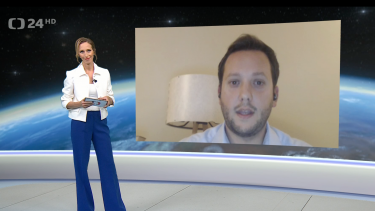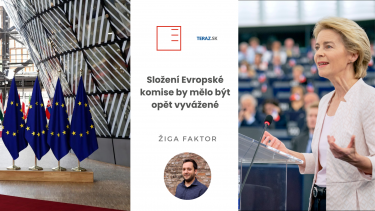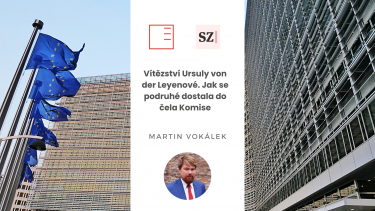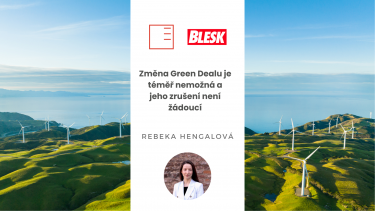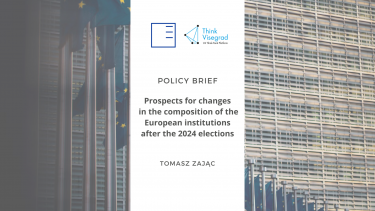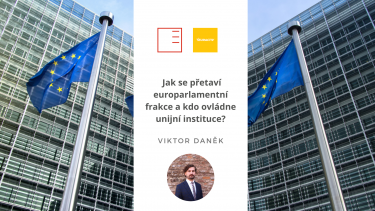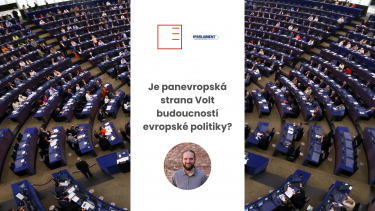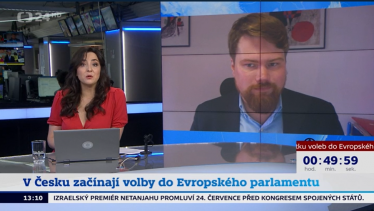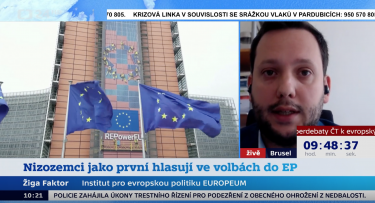Horizont ČT24 | Triumph of far-right populists in Austria
The far-right Freedom party of Austria won country's parliamentary elections. Žiga Faktor, deputy director and head of the EUROPEUM Institute's Brussels office, commented for foreign desk broadcast on ČT24 on the results to the National Council, the lower house of parliament.
Show more
Teraz.sk | Will the composition of the European Commission be balanced again?
President of the European Commission Ursula von der Leyen presents the composition of the new EU executive to the Conference of Presidents of the European Parliament on Wednesday 11 September. This will include the portfolio presented and the work agenda assigned to each commissioner. According to Slovakian TASR, it is already certain that the European Commission will not be gender balanced as it was in 2019-2024. Žiga Faktor, deputy director of EUROPEUM Institute and head of the Brussels office, commented for Teraz.sk.
Show more
Seznam Zprávy | The victory of Ursula von der Leyen. How she became president of the Commission for the second time
Ursula von der Leyen has secured another five years at the helm of the EU executive. She received more support from MEPs in a secret ballot than five years ago. She succeeded despite leading the Commission through times of unprecedented crises. Martin Vokálek, Executive Director of EUROPEUM Institute, reviewed previous five-year term for Seznam Zprávy.
Show more
Blesk.cz | Changing the Green Deal is almost impossible and its cancellation is not desirable
The Czech government's press conference on Wedesday was delayed by nearly two hours due to discussions on the giant nuclear tender for the completion of Dukovany. The originally planned approval of the Czech Green Deal was postponed. Prime Minister Fiala emphasized that no new commitments would be adopted and the government would seek to mitigate the impacts of previously approved measures. However, as noted by researcher Rebeka Hengalová from EUROPEUM Institute for Blesk.cz, altering the Green Deal is nearly impossible and canceling it is neither feasible nor desirable.
Show morePolicy Brief | Prospects for changes in the composition of the European institutions after the 2024 elections
This policy brief analyses the prospective changes in the European Parliament (EP) composition following the 2024 elections. It reflects on the evolving political environment since 2019, highlighting shifts in party dynamics within the EP, such as the fragmentation of traditional party dominance and the emergence of new political alignments. Additionally, it explores potential reconfigurations in top EU positions post-elections and examines ongoing concerns regarding geographical representation within EU institutions, particularly the European Commission. Writes Tomasz Zając from the Polish Institute of International Affairs (PISM).
Show moreEuractiv.cz | Post-election reshuffles. How will the European Parliament factions transform and who will dominate the EU institutions?
The key issues for the new term in the EU do not end with the European elections. Forces in European Parliament continue to shift depending on factions, while leaders select institutional leadership. How will the elections and the composition of the European Parliament influence the future functioning of the EU? And who will lead it? Viktor Daněk, Deputy Director of EUROPEUM Institute, answered these questions for Euractiv.cz.
Show moreThe Parliament Magazine | Is pan-European party Volt the future of EU politics?
The political group Volt received five times more votes in this year's European elections compared to 2019. Does it have the potential to gain even more support? Where did this political group come from and what is in its program? Vít Havelka, Senior Researcher at EUROPEUM Institute, commented for The Parliament Magazine.
Show more
ČT24 | Low turnout of Czech voters in European elections
Czechs wield significant power in Brussels, within the European Union, we rank as the ninth most populous country, placing us among the medium-sized nations. Moreover, Czechia is economically strong country. Yet, the turnout of Czech voters in European elections remains traditionally low, not only compared to other elections in the Czech Republic but also on a European scale. Martin Vokálek, Executive Director of EUROPEUM Institute, discussed low turnout and other topics for ČT24.
Show more
ČT24 | European Parliament elections begin
Do the elections across European countries have a common theme? If far-right parties succeed, can they unite? How can the problem of long-term low voter turnout in European elections be explained? Is this trend only in Central Europe? Can candidates for the European Parliament really deliver on what they promise? What happens immediately after the elections? Žiga Faktor, Deputy Director and Head of the Brussels Office of EUROPEUM Institute, answered these and other questions.
Show more
RILSA | The uncertain fate of the Green Deal for Europe ahead of the European Parliament elections
Farmers' protests have reminded that the measures of the Green Deal for Europe may not be politically viable for Europeans. To make climate policies politically viable, the EU should therefore focus on its commitment not to leave anyone behind in the green transition. Klára Votavová, a researcher at EUROPEUM Institute for European Policy, discusses the current development of the Green Deal for Europe and its social policy aspects in an expert publication for the Social Policy Forum.
Show moreStaroměstské náměstí 4/1
Prague 1 - Staré Město
110 00
tel.: +420 212 246 552
email: europeum@europeum.org
https://www.europeum.org
